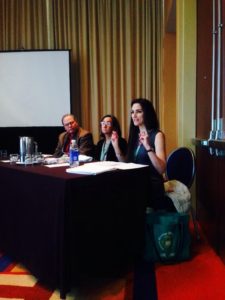
Kate Daley-Bailey received her A.B. (2001) and M.A. (2004) degrees in Religion from the University of Georgia. She has taught Religion courses at the collegiate level for the last ten years at Georgia State University, Georgia Perimeter College, and the University of Georgia. Daley-Bailey’s primary research interests are Religion, Literature, and the Arts, Theory and Methods, and Religion in Popular Culture. A regular contributor to the online magazine, Religion Nerd, she also, sporadically, writes posts for the Bulletin for the Study of Religion blog. Daley-Bailey recently presented her research on the construction of ‘human nature’ in world religion textbooks at the Annual meeting of the American Academy of Religion. As of this summer, she left adjunct teaching and has taken a full-time academic advisor position at the University of Georgia.
The first rule of adjuncting is you don’t talk about adjuncting.[1] The second rule of adjuncting is… you don’t talk about adjuncting! If you have seen the film Fight Club, a visually stunning piece based on Chuck Palhnuik’s book by the same title which savagely critiques modern consumerism, you know that I am making a link here between this film and the role of the adjunct in American higher education.
According to Oxford Dictionaries, scientifically speaking, a tomato is a fruit. In the culinary world, the tomato is referenced as a vegetable because it is savory. Notice that the argument has morphed from pertaining to what category the tomato is in based on its qualities to a matter of who is doing the speaking. Budding theorists may find themselves conscripted into the ideological battles over the nature of religion or, to put a finer point on the argument, how scholarship in religious studies should be done.
This work is licensed under a Creative Commons Attribution- NonCommercial- NoDerivs 3.0 Unported License.
The views expressed in podcasts, features and responses are the views of the individual contributors, and do not necessarily reflect the views of The Religious Studies Project or our sponsors. The Religious Studies Project is produced by the Religious Studies Project Association (SCIO), a Scottish Charitable Incorporated Organisation (charity number SC047750).